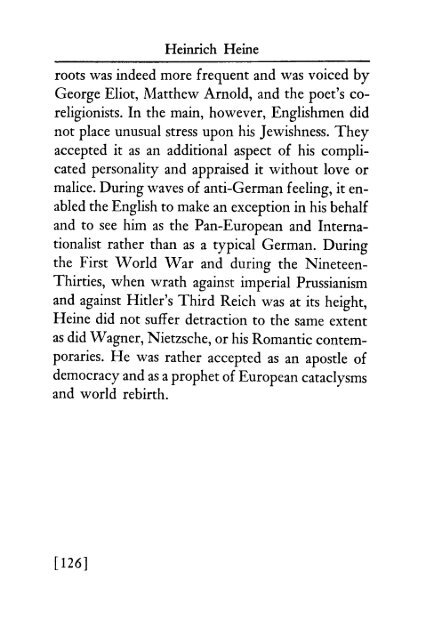HEINRICH HEINE - Repositories
HEINRICH HEINE - Repositories HEINRICH HEINE - Repositories
Heinrich Heine roots was indeed more frequent and was voiced by George Eliot, Matthew Arnold, and the poet's coreligionists. In the main, however. Englishmen did not place unusual stress upon his Jewishness. They accepted it as an additional aspect of his complicated personality and appraised it without love or malice. During waves of anti-German feeling, it enabled the English to make an exception in his behalf and to see him as the Pan-European and Internationalist rather than as a typical German. During the First World War and during the Nineteen- Thirties, when wrath against imperial Prussianism and against Hitler's Third Reich was at its height, Heine did not suffer detraction to the same extent as did Wagner, Nietzsche, or his Romantic contemporaries. He was rather accepted as an apostle of democracy and as a prophet of European cataclysms and world rebirth. [126]
CHAPTER VI BARD OF DEMOCRACY IN 1888 there appeared the first full-length English biography of Heine which laid main stress upon his modernism and cosmopolitanism. Its author was William Sharp, who afterwards established a considerable reputation as a poet in his own right under the pseudonym of "Fiona Macleod." Thirteen years previously, William Stigand had published a two-volume biography for English readers, but despite its bulk, it was hardly more than a compilation of famihar material based upon Adolf Strodtmann's German book, with the addition of numerous Heine-quotations. Stigand himself took no stand on any of the controversial aspects of his hero's personality. He failed to integrate the mass of detailed information and, as a result, there did not emerge any clear, incisive portrait of the poet and thinker. Sharp, on the other hand, boldly unravelled the complexities of his subject. He continued the English tradition established [127]
- Page 570 and 571: Heinrich Heine and continuator of t
- Page 572 and 573: Heinrich Heine there was in all Hei
- Page 574 and 575: Heinrich Heine mately alhed with su
- Page 576 and 577: CHAPTER IV HELLENIST AND CULTURAL P
- Page 578 and 579: Heinrich Heine the Hellenism of Hei
- Page 580 and 581: Heiruich Heine wines, if I myself,
- Page 582 and 583: Heinrich Heine offered as a substit
- Page 584 and 585: Heinrich Heine And groweth wan and
- Page 586 and 587: Heinrich Heine while doing justice
- Page 588 and 589: Heinrich Heine him, as it had been
- Page 590 and 591: Heinrich Heine fore it, seeing that
- Page 592 and 593: Heinrich Heine intense and luminous
- Page 594 and 595: Heinrich Heine The nostalgia of the
- Page 596 and 597: Heinrich Heine tion of his Hebraic
- Page 598 and 599: Heinrich Heine lish co-religionists
- Page 600 and 601: Heinrich Heine 1841, was Heine used
- Page 602 and 603: Heinrich Heine very tempest \\hich
- Page 604 and 605: Heinrich Heine character for that r
- Page 606 and 607: Heinrich Heine and paid but httle a
- Page 608 and 609: Heinrich Heine people by turns, the
- Page 610 and 611: Heinrich Heine strange mixture of r
- Page 612 and 613: Heinrich Heine 1884 concerning her
- Page 614 and 615: Heinrich Heine ZangwiU's essay had
- Page 616 and 617: Heinrich Heine then it was not surp
- Page 618 and 619: Heinrich Heine ments was Jewish hat
- Page 622 and 623: Heinrich Heine by Lord Houghton and
- Page 624 and 625: Heinrich Heine this book, Ellis fou
- Page 626 and 627: Heinrich Heine view of September, 1
- Page 628 and 629: Heinrich Heine racial hatreds as a
- Page 630 and 631: Heinrich Heine eve of the First Wor
- Page 632 and 633: Heinrich Heine 8, 1888, wrote that
- Page 634 and 635: Heinrich Heine upon the imagination
- Page 636 and 637: Heinrich Heine Were all you had, pa
- Page 638 and 639: Heinrich Heine gems of the Book of
- Page 640 and 641: Heinrich Heine is Wordsworth's,' I
- Page 642 and 643: Heinrich Heine under the pseudonym
- Page 644 and 645: Heinrich Heine poetry, preferred to
- Page 646 and 647: Heinrich Heine sure I had done one
- Page 648 and 649: Heinrich Heine of a Teutonic return
- Page 650 and 651: Heinrich Heine mently was the offic
- Page 652 and 653: Heinrich Heine \\'as an affectation
- Page 654 and 655: Heinrich Heine where the nightingal
- Page 656 and 657: Heinrich Heine ter, and godlessness
- Page 658 and 659: CHAPTER VII CITIZEN OF THE WORLD WH
- Page 660 and 661: Heinrich Heine man poets. Little wo
- Page 662 and 663: Heinrich Heine In contrast to the C
- Page 664 and 665: Heinrich Heine planation in the fac
- Page 666 and 667: Heinrich Heine he did not like the
- Page 668 and 669: Heinrich Heine vantage-point at the
Heinrich Heine<br />
roots was indeed more frequent and was voiced by<br />
George Eliot, Matthew Arnold, and the poet's coreligionists.<br />
In the main, however. Englishmen did<br />
not place unusual stress upon his Jewishness. They<br />
accepted it as an additional aspect of his complicated<br />
personality and appraised it without love or<br />
malice. During waves of anti-German feeling, it enabled<br />
the English to make an exception in his behalf<br />
and to see him as the Pan-European and Internationalist<br />
rather than as a typical German. During<br />
the First World War and during the Nineteen-<br />
Thirties, when wrath against imperial Prussianism<br />
and against Hitler's Third Reich was at its height,<br />
Heine did not suffer detraction to the same extent<br />
as did Wagner, Nietzsche, or his Romantic contemporaries.<br />
He was rather accepted as an apostle of<br />
democracy and as a prophet of European cataclysms<br />
and world rebirth.<br />
[126]



